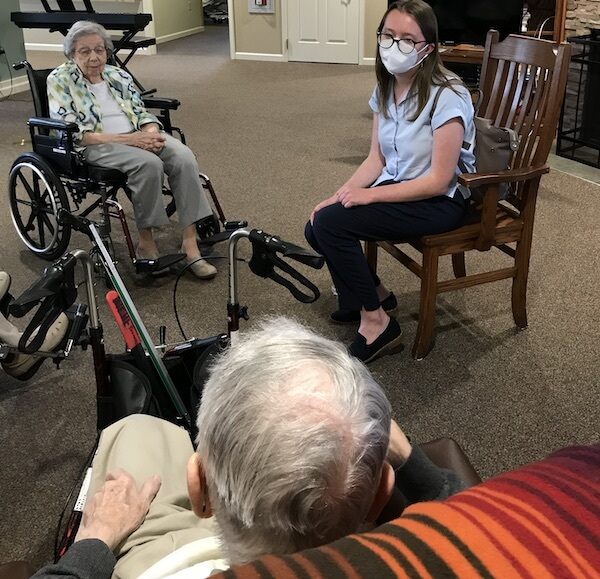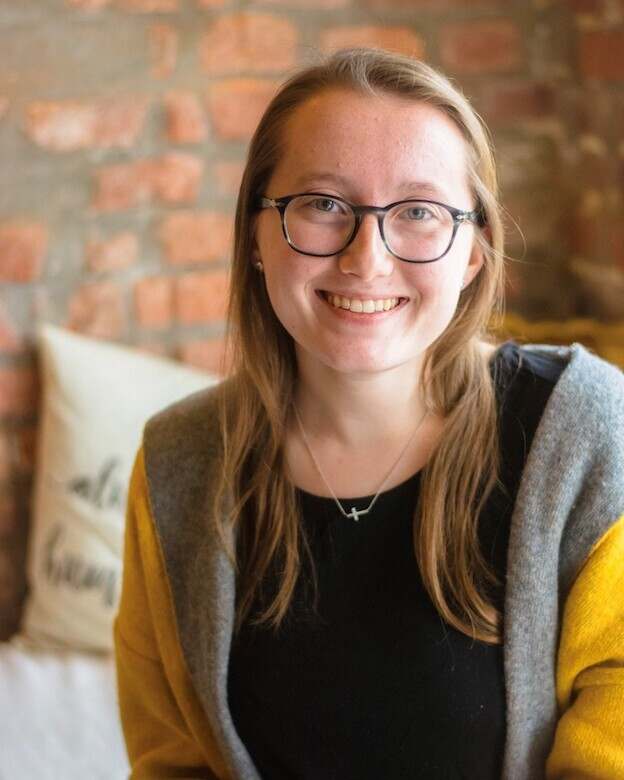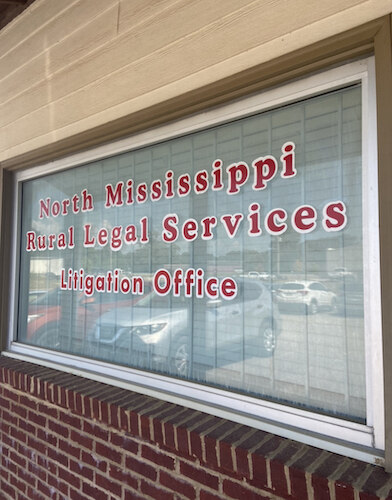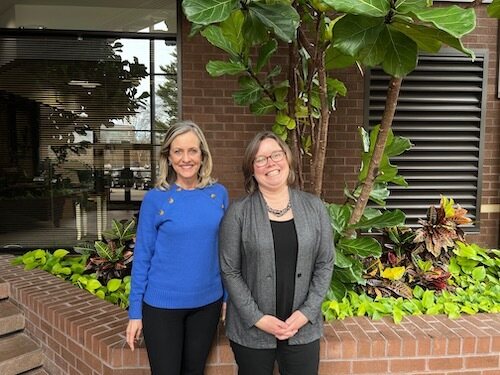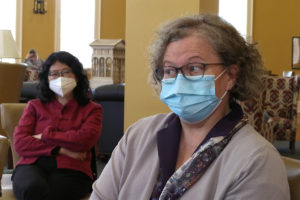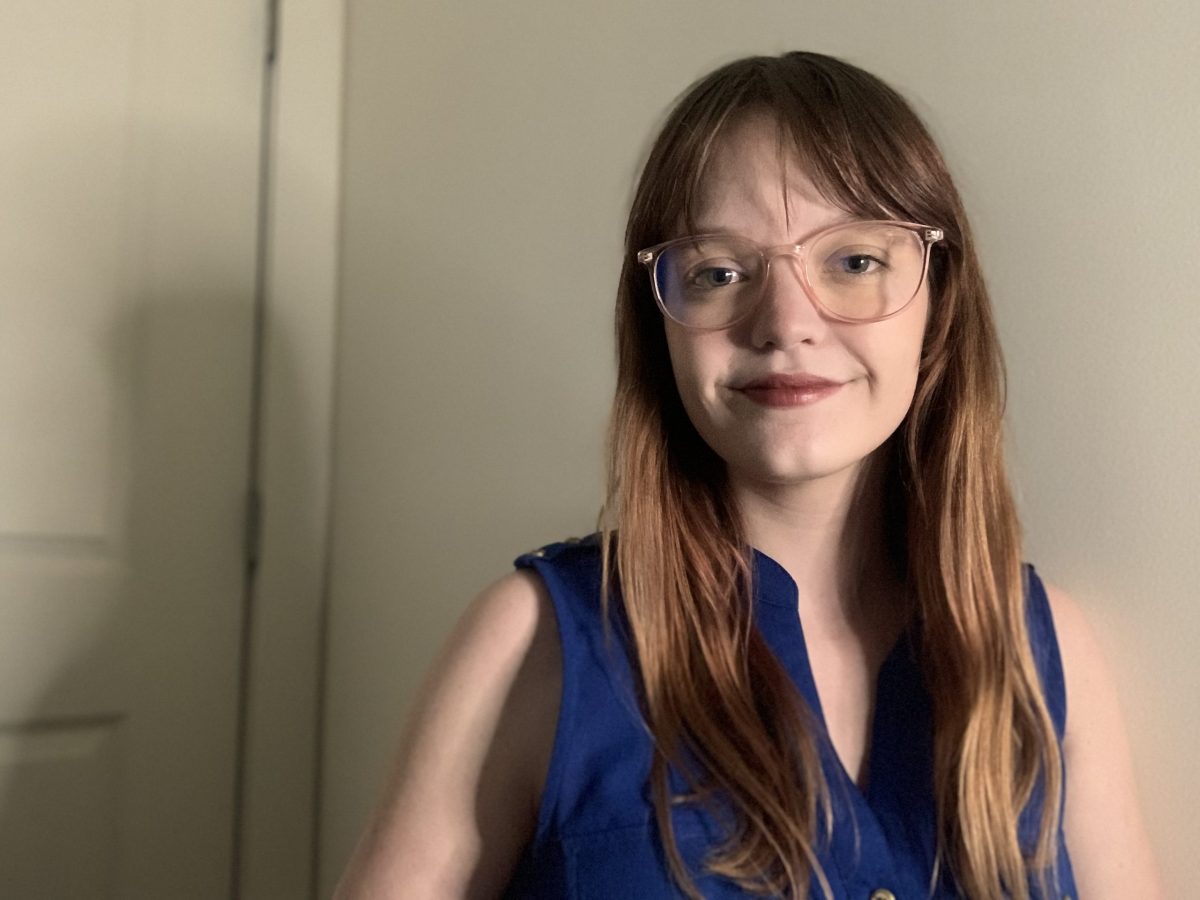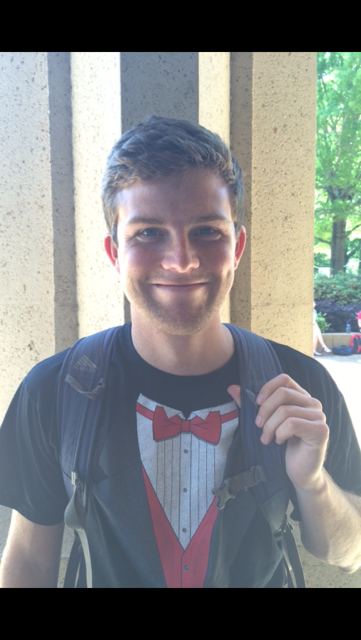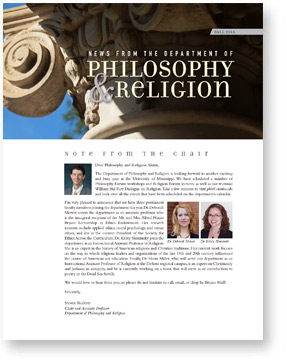Religion IN THE NEWS
New Course Allows Students to Learn and Experience Religious Relics
Pilgrimage class offers hands-on experience and opportunity to collaborate across disciplines
BY
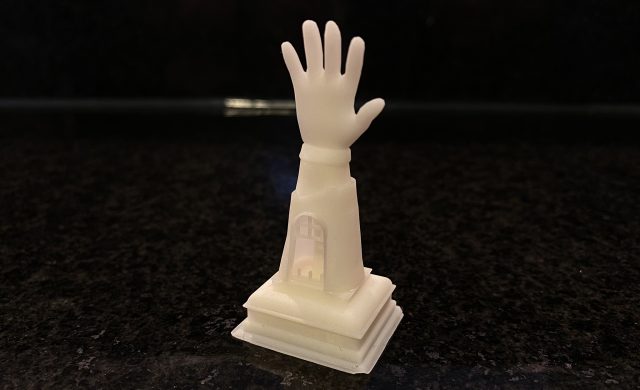
This 3D reliquary model of a hand was printed during a trial run for REL 340: Pilgrimage: Sacred Journeys, a new course being offered at the university this fall. The class is a collaborative effort between the Department of Religion and Philosophy and the Department of Mechanical Engineering. Photo courtesy of Yiwei Han/Department of Mechanical Engineering
OXFORD, Miss. – A University of Mississippi professor has created a new religion course that combines academic study of religious pilgrimages with the creation of 3D images of ancient relics.
The course, REL 340: Pilgrimage: Sacred Journeys, examines many material objects that serve as pilgrimage destinations – particularly saints’ relics, which can be corporal, such as bones, or contact, such as cloth or oils, said Mary Thurlkill, professor of religion. For example, religious pilgrims visit Mount Sinai in Egypt, the “head of John the Baptist” in Rome and Jesus’ “crown of thorns” in Paris.
Relics are generally displayed in reliquaries, which can be extravagantly adorned cases or simple mounts.
“My students will research different pilgrimage destinations, both their historical foundations and contemporary rituals, and design their own reliquary for an imagined relic,” Thurlkill said. “They will learn about a particular holy place and will think critically about how material culture – i.e., the ‘stuff’ of religion – links with belief – i.e., the ‘theology’; how human beings ‘live’ their religion through various rituals; and why such material objects/symbols are important to us.”
Students taking the course said they are enthusiastic about what they will learn during the semester.
“It’s a really amazing class,” said Johnathon “JC” Smith Jr., a senior from Mooreville who is majoring in philosophy with an emphasis in religious studies. “Pilgrimages are something that is seen in every religion, and in every culture.
“The course is beneficial because it demonstrates, just like religious studies and like all the humanities, there are many paths to truth and understanding.”
A unique assignment in Thurlkill’s course involves a collaboration with Yiwei Han, an assistant professor of mechanical engineering, and his M E 523: Introduction to Additive Manufacturing course. Students from Thurlkill’s class will get experience in 3D printing, while students from Han’s class will gain some knowledge in the humanities.
“I first approached Dr. Han about the joint assignment after reading an article about a museum that produced 3D models of certain artifacts for their audience to handle/touch,” Thurlkill said. “This intrigued me because, by doing so, the museum was allowing another sensory ‘engagement’ with historical artifacts – through touch.
“It also demonstrated how the humanities – in this example, museum studies and fine arts – link with so many different fields.”
Han said he sees the venture as a great idea for students from two totally different fields to work together.
“This is the first time we have applied 3D printing in REL 340 class,” he said. “It is not often for us to see some works that combine 3D printing and religion. This time, students will have a chance to apply their skills to archive something that they have never done before.”
Han’s research interests are micro/nano fabrication, additive manufacturing, advanced manufacturing and printing electronics. His graduate students and other students interested in his research are using his lab, which houses a 3D printer customized for high-resolution 3D and 4D printing.
Han said the experience is very important for engineering students.
“With the real-world application, they can get many hands-on experiences that will help them in the future,” he said. “The students who take this class will perform interdisciplinary research and get some experience of working with others from outside of their fields.”
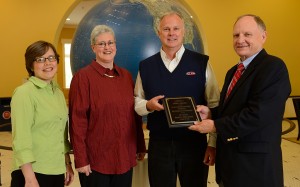
Glenn Hopkins (right), dean of the University of Mississippi College of Liberal Arts, congratulates (from left) Sarah Moses, Felice Coles and Michael Raines on their teaching awards. Photo by Robert Jordan/Communications.
Sarah Moses, assistant professor of religion, received the
Cora Lee Graham Award for Outstanding Teaching of Freshmen
from the University of Mississippi College of Liberal Arts.
BY ELAINE PUGH
MAY 11, 2013
Sarah Moses, assistant professor of religion, received the Cora Lee Graham Award for Outstanding Teaching of Freshmen from the University of Mississippi College of Liberal Arts.
One of only three faculty members in 2012-13 honored by the College. Moses was recognized Saturday, May 11 2013 at the College commencement ceremony in Tad Smith Coliseum.
The selection process involved nominations from students and fellow faculty, which were considered by a committee of former recipients based on criteria that includes excellence in class instruction, intellectual stimulation of students and concern for students’ welfare.
The nomination letters followed a theme of selflessness, professional passion and individual attention to students.
Of Moses, one colleague referred to how her students regularly give her high marks in teaching evaluations and wrote the following:
“Dr. Moses is more than an excellent teacher; she is also a caring mentor. Teaching religion has some unique challenges, compared to teaching chemistry, for example. The teacher is exposing students to belief systems that are quite different than their own deeply held beliefs. … It takes great skill to negotiate such controversial terrain. One has to earn the respect of the students to take them on this journey.”
Moses received validation of her worthiness for the award from Steven C. Skultety, professor and chair of the Department of Philosophy and Religion. He lauded the honored faculty member.
“Like other well-respected teachers, Dr. Moses brings an incredible amount of enthusiasm to her teaching, and she thinks very carefully about which material will interest and challenge our students. What sets her apart, however, is her uncanny ability to exert authority and make students feel like sharing and participating at one and the same time. Students in her classes never feel they are receiving a pre-packaged lecture, but believe they are entering a conversation led by a sympathetic expert.”
The honored faculty member expressed surprise and appreciation for having been chosen.
“Teaching is my favorite part of being an academic,” Moses said. “When I think of freshmen who are just setting out on the intellectual, social and personal journey of college, I consider it a great privilege to help them to deepen their understanding of the world in which they live, particularly about religious studies. And so it is very gratifying to me to know that some of my students have had a positive learning experience in my classes and honored me by nominating me for this award.”
Moses joined the university in 2008. She specializes in religious and medical ethics and contemporary religious thought. Each semester, she teaches several sections of REL 101: Introduction to Religion. She holds a master’s from Harvard Divinity School and a doctorate in theological ethics from Boston College.
A University of Mississippi graduate has gained national recognition as a creative writer with a piece of fiction that explores boundaries of the human heart.
BY ELAINE PUGH, SEPTEMBER 12, 2012
Andrew Paul of Clinton, who graduated in May 2012 as a member of the Sally McDonnell Barksdale Honors College, is one of three new national Portz Scholars, named by the National Collegiate Honors Council. This is the second consecutive year for the University of Mississippi to produce a Portz, and Paul becomes the university’s fourth Portz Scholar since 2002.
Majoring in religious studies, Paul composed his winning work, titled “The River Thief: A Collection of Short Fiction,” for his honor’s thesis. He has been invited to present it at the November NCHC convention in Boston. Each year, the NCHC invites honors colleges nationwide to submit outstanding research/creative papers written by their students; from those submissions, only three scholars are selected.
“When we select our nominee for the Portz, we look for work that pushes the boundaries of what is known, and does so in a professional manner,” said Honors College Dean Douglass Sullivan-González. “Andy uses fiction to explore the boundaries of the human heart. It is not an easy journey, but Andy makes it rich and worth the risks.”
Paul’s skills as a creative writer were honed under the tutelage of two award-winning writers, both UM faculty members. Jack Pendarvis, writer-in-residence, and Tom Franklin, assistant professor of fiction writing, served as director and second reader for Paul’s collection.
Paul said it’s a real honor to be recognized for his work.
“I would have been happy enough to simply finish the collection, but having other people enjoy it and want to promote it is amazing,” he said. “I plan on expanding my thesis by another two or three stories, then beginning a new collection.
“I’m particularly interested in what it means to be a modern Jew in the South. I tried my best to merge the Southern writing that I love–Lewis Nordan, Barry Hannah, Tom Franklin and others–with Eastern European Jewish archetypes and folktales. A lot of Southern Jewish ‘culture’ I’ve seen appears to boil down to Judaism meets fried chicken. I want to show that there is a lot more to it than that–that there are a lot of complex nuances and issues related to the culture.”
As for the future, Paul said he plans to apply to M.F.A. programs around the country and hopes to eventually get his first collection of stories picked up by a publisher.
Other University of Mississippi Portz Scholars are Ryan Parsons (2011) of Hattiesburg, international studies and Chinese; Heather Carrillo (2006) of Little Rock, Ark., classics and art history; and Amanda Guth of Tremont (2002), psychology and biology.
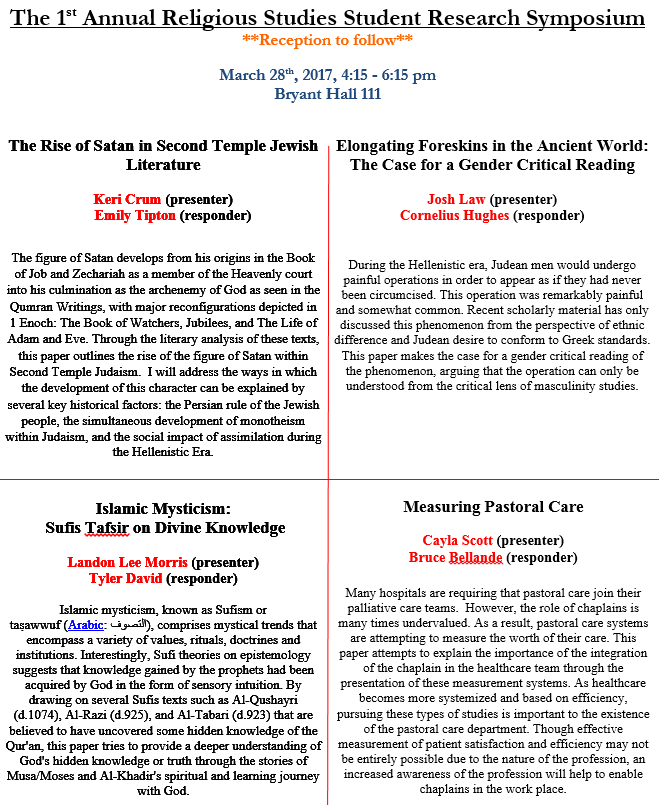
Congratulations to Joshua Law!
Joshua Law, a senior Religious Studies major and Taylor Medal recipient, has had an essay selected for publication in the Journal of Theta Alpha Kappa. The essay analyzes the Jewish practice of epispasm, or reverse circumcision, and the polemic against it, from a gendered perspective.
